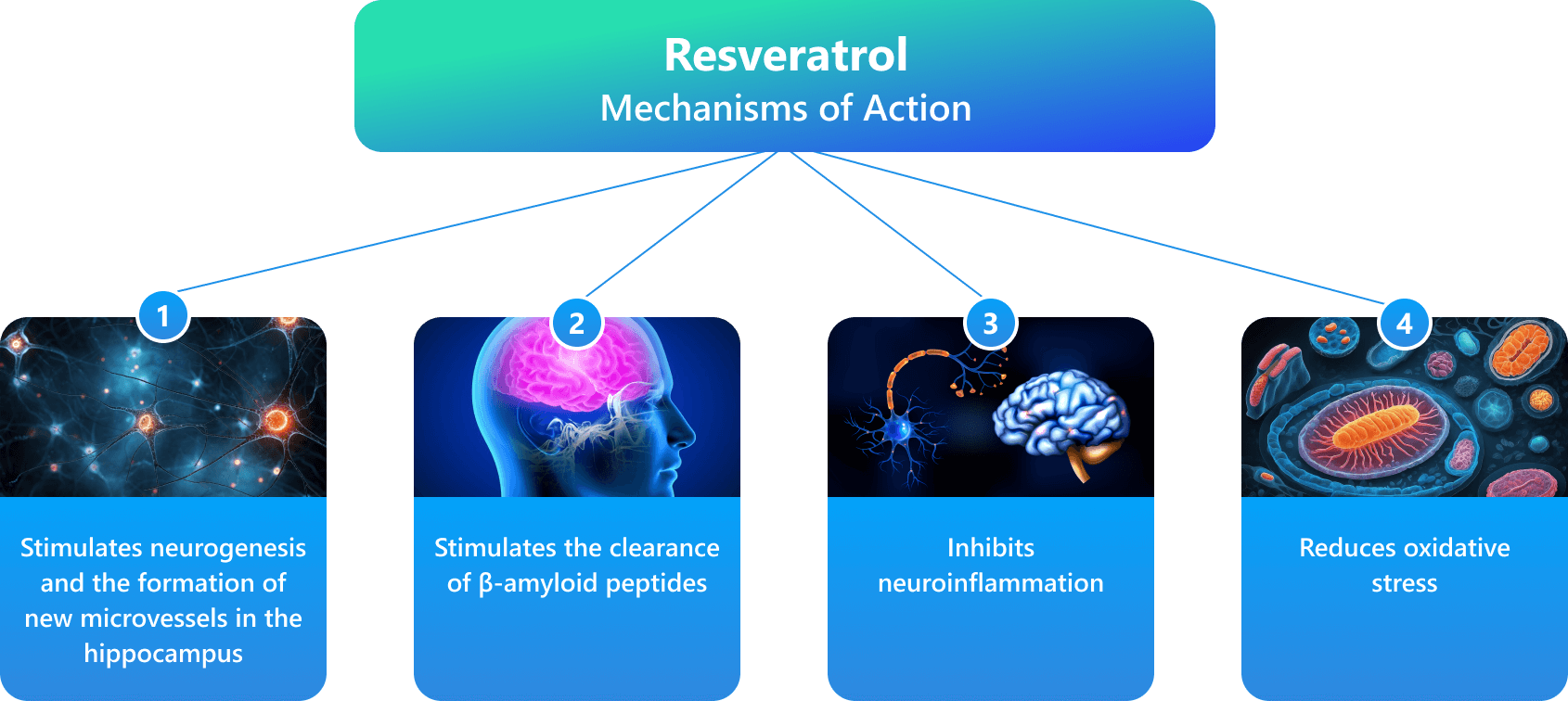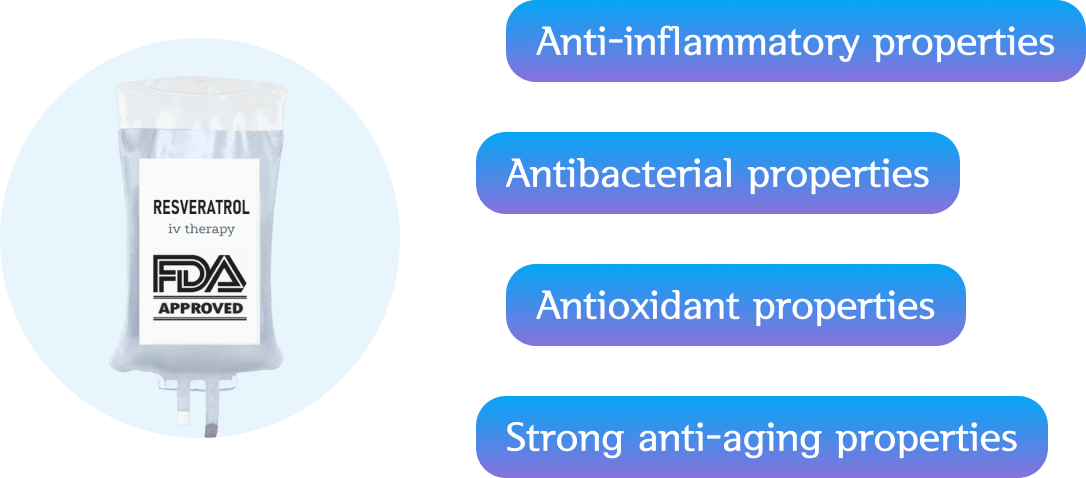 Resveratrol is a natural polyphenol compound found in red grapes, peanuts, and some berries. It has been linked to multiple health benefits, including enhanced cognitive function. Resveratrol’s impact on neurodegenerative diseases like Alzheimers and dementia has been extensively researched, with encouraging findings for those facing cognitive challenges.
Resveratrol is a natural polyphenol compound found in red grapes, peanuts, and some berries. It has been linked to multiple health benefits, including enhanced cognitive function. Resveratrol’s impact on neurodegenerative diseases like Alzheimers and dementia has been extensively researched, with encouraging findings for those facing cognitive challenges.
Learn about resveratrol benefits for brain health, and the best way to leverage its advantages as a supplement.
Factors Affecting Brain Health and Cognitive Decline
Subjective cognitive decline (SCD) is a cognitive impairment marked by mental confusion and memory loss, and one of the early signs of Alzheimer’s disease and dementia. SCD inhibits the brain’s ability to learn, remember, and make decisions. People with SCD have difficulty managing activities of daily living (ADLs) and making sound decisions. As the disease progresses, the burden of caring for a loved one with SCD often falls on families,
According to the Centers for Disease Control and Prevention (CDC), subjective cognitive decline is on the rise in the USA, affecting one out of nine adults age 45 and older, with a slightly higher prevalence among men. Over two-thirds of patients with SCD have two or more chronic metabolic disorders such as diabetes, hypertension and heart disease, suggesting a strong link between lifestyle factors and cognitive decline.
The CDC has identified multiple lifestyle factors that contribute to cognitive decline, including:
- Insufficient physical activity
- Cigarette smoking
- Excessive alcohol consumption
- Obesity
- Hypertension
- Diabetes
- Excess sugar consumption
- Depression
- Hearing loss
It has been well-established that the underlying drivers of cognitive decline – β-amyloid (in senile plaques) and tau (in neurofibrillary tangles) – begin to accumulate decades before dementia symptoms first appear. By making positive lifestyle choices early on in life, you can substantially reduce your risk of SCD while dramatically improving your overall health and quality of life.
The rapid rise in SCD has incited a plethora of scientific research in hopes of finding interventions that can help halt and reverse cognitive decline. One promising natural compound for combatting SCD is resveratrol, a food derivative found in grapes, peanuts and berries.
Resveratrol Mechanisms of Action
Resveratrol helps to improve brain health via four mechanisms of action:
- Stimulates neurogenesis and the formation of new microvessels in the hippocampus. Changes in mood and memory loss both stem from impaired hippocampus function. Resveratrol helps to significantly improve spatial learning, memory formation, and mood.
- Stimulates the clearance of β-amyloid peptides. An important feature of Alzheimer’s disease is the accumulation senile amyloid plaques in brain tissue that are toxic to cells. Plaque buildup leads to progressive neuronal dysfunction and eventual death. Resveratrol helps to reduce and clear plaque in certain regions of the brain.
- Inhibits neuroinflammation. Senile plaques in the brains of Alzheimer patients release cytotoxic molecules that trigger inflammation and further promote the accumulation of β-amyloid peptides. Resveratrol helps to inhibit the inflammatory response to prevent further damage to neurons.
- Reduces oxidative stress. Oxidative stress causes damage to cellular mitochondria, thus undermining cellular function. Resveratrol helps to reduce oxidative stress in brain cells associated with cognitive decline.

Resveratrol Benefits for Brain Health
Nature provides infinite resources for promoting human health. Pharmacology often seeks to imitate the effects of natural substances with synthetic drugs, but they almost always come with harmful side effects. Resveratrol is a nutrient, not a drug, and you do not need a medical prescription to enjoy its benefits. Side effects of resveratrol are confined to mild digestive complaints.
Resveratrol combats brain and heart inflammation by providing a protective lining for blood vessels, and it may have neuroprotective properties that help to preserve memory and brain function. It is also thought to help prevent heart disease and strokes
Resveratrol has multiple beneficial effects on human health:
- Its anti-inflammatory properties help to mitigate chronic systemic inflammation, a key precursor to metabolic disease and cognitive decline
- It’s antibacterial properties provide immune system support
- Its antioxidant properties provide protection for the brain, heart and nervous system
- Its strong anti-aging properties help to enhance memory and delay brain dysfunction

While resveratrol does not provide a stand-alone solution for combating cognitive decline, it can play an important role, especially when combined with positive lifestyle modifications.
How to Leverage Resveratrol Brain Benefits
The highest levels of resveratrol are found in dark red wines like Pinot Noir, Malbec and Merlot. However, a single 5-ounce glass of red wine provides a fairly low dose of only 0.5 mg. Red wine and grape extracts are often used in dietary supplements, providing much larger doses of resveratrol. But oral resveratrol supplements vary greatly in quality, and much of its potency is lost during the digestive process.

Resveratrol IV infusion is the most direct way to provide your cells with high-potency resveratrol. During an IV therapy session, nutrients are slowly dripped directly into your bloodstream, where they are quickly carried to cells throughout your body. Not only does IV infusion enhance resveratrol absorption, but it eliminates any potential digestive side effects.
Get High-Potency Resveratrol via IV Infusion in NYC
Supplementing with resveratrol can help to boost cognition and support brain health. Proactively combating cognitive decline early in life can spare you from an old age filled with confusion and memory loss. If you already have symptoms of cognitive decline, resveratrol infusion therapy may help to slow its progress.
Invita Wellness makes it easy to push back against SCD with high-potency IV infusions that deliver the benefits of resveratrol quickly to your cells. Contact Invita Wellness today to schedule your first resveratrol IV session.
to schedule your first resveratrol IV session
contact InVita Wellness today
Book Now
456 Broadway 2 Floor, New York, NY 10013, USA
Resources
Gomes, Bruno Alexandre Quadros, et al. “Neuroprotective mechanisms of resveratrol in Alzheimer’s disease: role of SIRT1.” Oxidative medicine and cellular longevity 2018.1 (2018): 8152373.
https://onlinelibrary.wiley.com/doi/full/10.1155/2018/8152373
Rao, Yelluru Lakshmisha, et al. “Neuroprotective effects of resveratrol in Alzheimer’s disease.” Frontiers in Bioscience-Elite 12.1 (2020): 139-149.
https://www.imrpress.com/journal/FBE/12/1/10.2741/E863/htm
Tu, Wenling, Meiying Song, and Xiang Fan. “Does resveratrol improve cognition in humans? A scientometric study to an in‐depth review.” CNS Neuroscience & Therapeutics 29.9 (2023): 2413-2429.
https://onlinelibrary.wiley.com/doi/full/10.1111/cns.14276